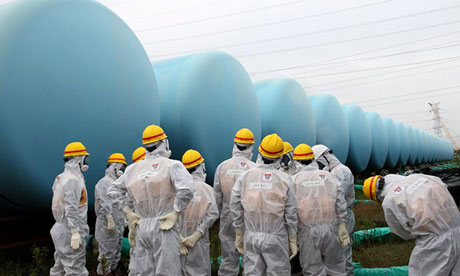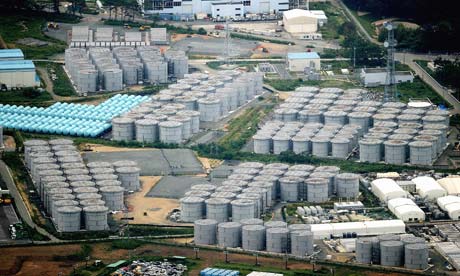MsMilkytheclown1
Published on Sep 5, 2013
Comments
on the contaminated water issue at Fukushima Daiichi NPS by president
Hirose What a Bunch of CRAP! Complete and utter Bullshit!
http://youtu.be/sJXVvLu6GXc
http://tinyurl.com/lgydnew
Can an Ice Wall Save Fukushima?http://youtu.be/sJXVvLu6GXc
http://tinyurl.com/lgydnew
http://youtu.be/EsM4wuRUvsU
Fukushima Daiichi Nuclear Power Station Unit 1 turbine building inflow of groundwater
http://youtu.be/S5C7rI6Vcgs
Tokyo Olympic bid faces Fukushima concern
Members of Tokyo's Olympic bid committee have been questioned by journalists about contaminated water leaking from the stricken Fukushima nuclear power plant.
The host city for the 2020 games will be chosen on Saturday in the Argentine capital, Buenos Aires.
The Japanese committee members held a news conference in the city on Wednesday that was attended by about 100 journalists from more than 20 media outlets.
Bid committee president Tsunekazu Takeda said at the beginning that he hopes to spread the value of sports among young people by hosting an Olympics in Asia, home to more than 1 billion people.
4 out of the 6 questions asked were about the safety of Tokyo, in light of the radioactive water leak at the Fukushima plant.
Takeda responded saying Tokyo is safe in terms of radiation levels.
A British journalist said Tokyo officials only emphasize the city's safety but had still not answered the question. The reporter called it a grave problem that should be taken more seriously.
An American journalist expressed dissatisfaction with the answer and said the question will be asked repeatedly.
A reporter from an Argentine TV station said the Tokyo officials had answered the question sufficiently by saying the city is safe.
Sep. 5, 2013 - Updated 00:50 UTC
Leaked water may have reached groundwater
The operator of the damaged Fukushima Daiichi nuclear power plant says radioactive water that leaked from a storage tank may have reached groundwater.
Tokyo Electric Power Company says it detected high levels of radioactive substances in water collected on Wednesday at a monitoring well about 10 meters from the tank.
It says the water contained 650 becquerels per liter of beta-ray emitting substances, including strontium. The water was taken from about 7 meters deep, where groundwater is flowing.
Last month, TEPCO discovered more than 300 tons of contaminated water had leaked from the tank. Company officials said some of the water may have reached the sea.
Sep. 5, 2013 - Updated 11:23 UTC
Bonus Link for Today:
Hundreds of Whales Radiated to Death, by Fukushima
http://youtu.be/fZe46MJmA48
Latest Headlines: http://enenews.com/
Reuters: Crane arm snaps while removing debris from Fukushima Unit 3 (VIDEO)
TV: People will be consuming radioactive material coming from Fukushima — Seafood "much further away" from region will have unacceptable levels of contamination at times, says senior scientist (VIDEO)
Emergency declared at U.S. nuclear plant due to fire in turbine building — Two 'reflash events' occurred — Fire emergency lasted over four hours #PaloVerde
Japan Expert: Covering Fukushima reactors in concrete like at Chernobyl should be considered — Nuclear Official: If we just buried them, no one would want to look at another nuke plant
AP: "Major source" of ocean contamination from Fukushima not revealed — Nuclear waste exits from cracks in reactor buildings, then goes into Pacific — Never enters groundwater, flows directly through ground
Nuclear Experts: Situation at Fukushima "far worse than we truly know" — "No one really knows the true severity" — "We don't know anything yet"
New York Times: Experts warn molten fuel may be underground beneath Fukushima reactor buildings — Doubt that it can be extricated
Tokyo Professor: 'Huge' potential for harm from Fukushima contaminated water entering ocean — Warns of severe consequences
Report: Study warns Fukushima contamination "is becoming more concentrated as it crosses Pacific Ocean, rather than dispersing" — "It's making a beeline for U.S. West Coast" — "Scientists causing panic in public"
Reuters: "International alarm" — Fukushima radiation leaks spike to record levels — "Too little, too late" for Japan gov't
Japan Expert: Contamination from Fukushima is traveling "under the seabed" and spreading further out in Pacific Ocean — Measures needed to stop flow
NBC Nightly News: Concerns are growing tonight, especially out West, about the continuing radiation threat from Fukushima — Japanese Diplomat: U.S. food supply stands to be contaminated (VIDEO)
UC Berkeley Nuclear Professor: Work to go on for thousands of years at Fukushima site if they can't retrieve melted fuel (AUDIO)
Fukushima Plume Headed to Southern Hemisphere: Enters South Pacific and Indian Ocean after 2 decades — Will contain around 25% of total cesium-137 release
Nuclear Expert on CNN: "Organized denial" at Fukushima — "Tepco not in control at all" — "Very worrying" (VIDEO)
********************************************
Fukushima radiation leaks reach deadly new high
Exposure to emissions would be fatal within hours, say Japanese authorities, as race to build frozen wall begins
- theguardian.com, Wednesday 4 September 2013 02.03 EDT

Staff
of Japan's nuclear regulator near storage tanks for radioactive water
at the Fukushima Daiichi power plant. Photograph: EPA
On Wednesday the country's nuclear regulation authority said radiation readings near water storage tanks at the Fukushima Daiichi nuclear power plant have increased to a new high, with emissions above the ground near one group of tanks were as high as 2,200 millisieverts [mSv] per hour – a rise of 20% from the previous high.
Earlier this week the plant's operator, Tepco, said workers had measured radiation at 1,800 mSv an hour near a storage tank.
That was the previous highest reading since Tepco began installing tanks to store huge quantities of contaminated water that have built up at the plant.
An unprotected person standing close to the contaminated areas would, within hours, receive a deadly radiation dose. The nuclear regulation authority said the radiation comprised mostly beta rays that could be blocked by aluminium foil, unlike more penetrative gamma rays.
Read More Here
********************************************
Japan earmarks £300m+ for Fukushima cleanup
Tokyo unveils measures to decontaminate toxic water at nuclear power plant as Tepco struggles to prevent leaks into Pacific
- The Guardian, Tuesday 3 September 2013

Tanks of contaminated water at the Fukushima Daiichi plant, in Japan. Photograph: The Asahi Shimbun/Getty Images
The measures come as the plant's operator, Tokyo Electric Power (Tepco), struggles to prevent leaks into the Pacific Ocean and to find a way to contain and treat the huge volume of water that has accumulated at the site since it was hit by a tsunami in March 2011.
Last weekend, workers recorded radiation levels of up to 1,800 millisieverts an hour near one storage tank for the contaminated water. A radiation dose of that size is big enough to kill an unprotected person nearby in about four hours. Tepco said the radiation was emitted in the form of beta rays – which travel only short distances and can be easily shut out – and that workers had not been put at risk.
The government's decision to step in is widely seen as a safety appeal just days before the International Olympic Committee chooses between Tokyo, Istanbul and Madrid on which city will host the 2020 Olympics.
The prime minister, Shinzo Abe, said the government would take a more active role in the biggest nuclear cleanup in history, amid mounting concern that Tepco is no longer able to cope alone.
"The world is watching to see if we can carry out the decommissioning of the Fukushima nuclear power plant, including addressing the contaminated water issues," Abe reportedly told cabinet ministers.
Reports said that about 32bn yen of the 47bn yen in new funding would be spent on constructing a 1.4km-long underground frozen wall around four damaged reactors – an untested and expensive technique. The wall would prevent groundwater from mixing with coolant water that becomes contaminated after it comes into contact with melted nuclear fuel.
Read More Here
********************************************
Related articles












No comments:
Post a Comment
Hello and thank you for visiting my blog. Please share your thoughts and leave a comment :)